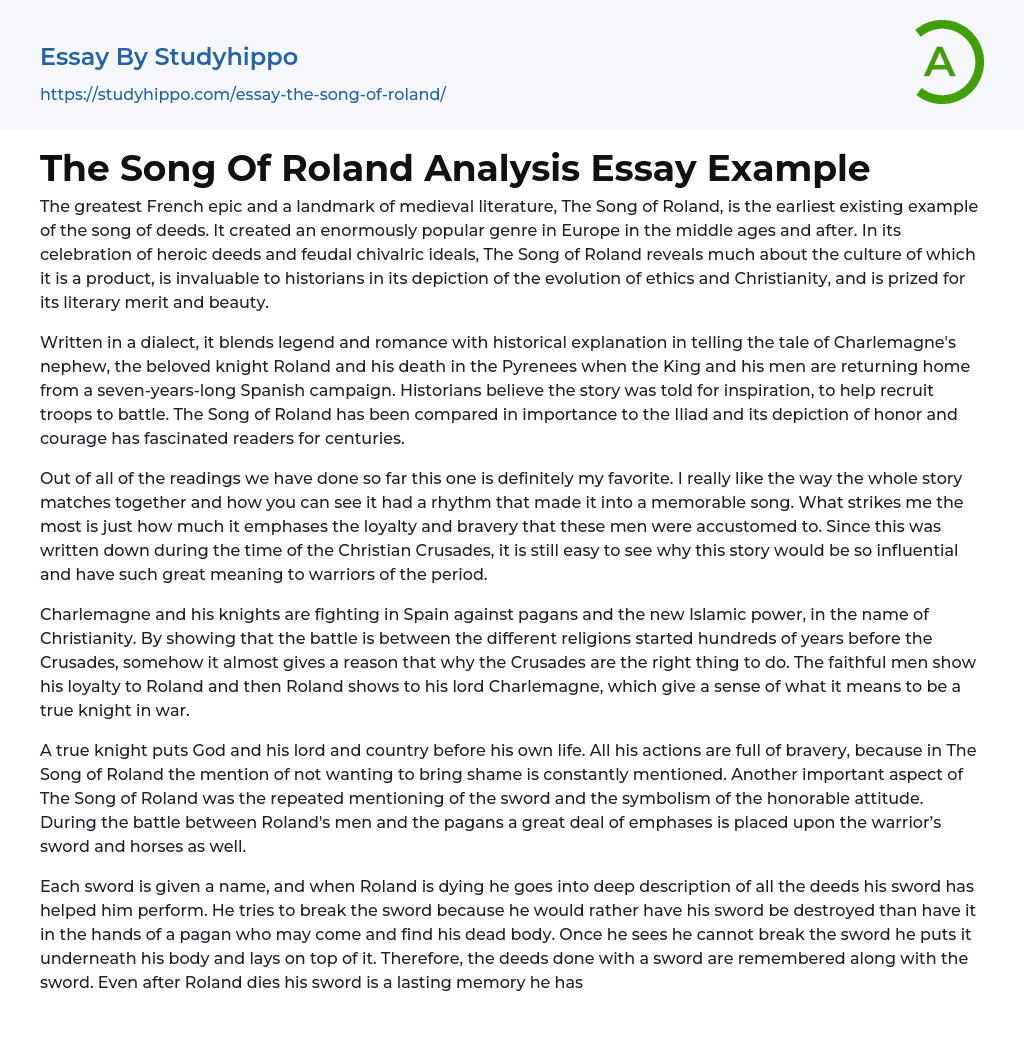The greatest French epic and a landmark of medieval literature, The Song of Roland, is the earliest existing example of the song of deeds. It created an enormously popular genre in Europe in the middle ages and after. In its celebration of heroic deeds and feudal chivalric ideals, The Song of Roland reveals much about the culture of which it is a product, is invaluable to historians in its depiction of the evolution of ethics and Christianity, and is prized for its literary merit and beauty.
Written in a dialect, it blends legend and romance with historical explanation in telling the tale of Charlemagne's nephew, the beloved knight Roland and his death in the Pyrenees when the King and his men are returning home from a seven-years-long Spanish campaign. Histo
...rians believe the story was told for inspiration, to help recruit troops to battle. The Song of Roland has been compared in importance to the Iliad and its depiction of honor and courage has fascinated readers for centuries.
Out of all of the readings we have done so far this one is definitely my favorite. I really like the way the whole story matches together and how you can see it had a rhythm that made it into a memorable song. What strikes me the most is just how much it emphases the loyalty and bravery that these men were accustomed to. Since this was written down during the time of the Christian Crusades, it is still easy to see why this story would be so influential and have such great meaning to warriors of the period.
Charlemagne and his knights
are fighting in Spain against pagans and the new Islamic power, in the name of Christianity. By showing that the battle is between the different religions started hundreds of years before the Crusades, somehow it almost gives a reason that why the Crusades are the right thing to do. The faithful men show his loyalty to Roland and then Roland shows to his lord Charlemagne, which give a sense of what it means to be a true knight in war.
A true knight puts God and his lord and country before his own life. All his actions are full of bravery, because in The Song of Roland the mention of not wanting to bring shame is constantly mentioned. Another important aspect of The Song of Roland was the repeated mentioning of the sword and the symbolism of the honorable attitude. During the battle between Roland's men and the pagans a great deal of emphases is placed upon the warrior’s sword and horses as well.
Each sword is given a name, and when Roland is dying he goes into deep description of all the deeds his sword has helped him perform. He tries to break the sword because he would rather have his sword be destroyed than have it in the hands of a pagan who may come and find his dead body. Once he sees he cannot break the sword he puts it underneath his body and lays on top of it. Therefore, the deeds done with a sword are remembered along with the sword. Even after Roland dies his sword is a lasting memory he has accomplished with it.
- Canterbury Tales essays
- Dulce Et Decorum Est essays
- My Last Duchess essays
- Beowulf essays
- Sir Gawain And The Green Knight essays
- The Road essays
- Aeneid essays
- Odyssey essays
- Blackberry Picking essays
- Beowulf Epic Hero essays
- Walk This Way essays
- Song Analysis essays
- Ambition essays
- Anger essays
- Betrayal essays
- Boredom essays
- Confidence essays
- Courage essays
- Desire essays
- Disgrace essays
- Doubt essays
- Empathy essays
- Fairness essays
- Fear essays
- Feeling essays
- Forgiveness essays
- Grief essays
- Guilt essays
- Happiness essays
- Harmony essays
- Hate essays
- Honesty essays
- Honor essays
- Hope essays
- Humanity essays
- Inspiration essays
- Kindness essays
- Laughter essays
- Loneliness essays
- Lost essays
- Loyalty essays
- Need essays
- Passion essays
- Pressure essays
- Pride essays
- Regret essays
- Respect essays
- Responsibility essays
- Sarcasm essays
- Shame essays




